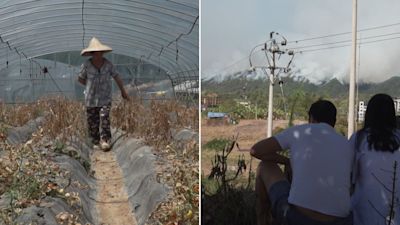Insight
China ups coal production as country suffers first ever drought emergency

A break in the heat is expected at the end of the month but for many, the harm has already been done, reports Asia Correspondent Debi Edward from Chongqing
We started our day in Chongqing talking to a crowd who had gathered to watch a wildfire that had broken out on a hillside on the outskirts of the city.
It started on Sunday night and on Monday morning smoke continued to billow into the sky and we could see flames erupting from parts of the parched land.
People had stopped to stare and take pictures because of the intensity and rarity of such a scene in this area. Although, they are becoming more common.
We ended the day with news that from Tuesday several shopping centres would only open at 4pm, instead of 10am, to relieve pressure on the grid. It was 42C on Monday, but with the humidity it felt like 47C.
Since July, temperatures have been consistently above 40C and rainfall has been non-existent throughout most of central and southern China. That’s created a surge in demand for air conditioning and refrigeration.
In Sichuan, where 80% of their electricity supply comes from hydropower, it has led to rationing and factory suspensions. Due to chronically low water levels, the power generated from hydro is down by 50%.
In Chongqing the summer rains never arrived, leaving dozens of rivers and reservoirs to dry up.
The prolonged dry, hot conditions have led China to declare its first drought emergency. The fire service has been drafted in to distribute water to several rural communities.
In response, the government has increased coal production. A heatwave linked to the effects of climate change, is being met with plans to expand carbon capacity.
In the southern city of Guangdong, it was announced construction will begin next month on five coal-fired power projects.
China is locked in a cycle of cause and effect, that impacts us all.
President Xi Jinping has signed up to global pledges to tackle climate change, he took a lead role in the Paris Climate Accord, but he can’t switch to renewable forms of energy fast enough to keep up with rising demands of his populous nation.
The frequent bouts of extreme cold and heat, linked to the warming of our planet and carbon emissions, have exacerbated the situation - keeping China in that vicious circle.
At this time last year, the famous Yangtze River was flooded. Now it is at its lowest level since records began.
I was able to stand on the riverbed in the middle of not only China’s most important waterway but a crucial transport link in the global supply chain.
Millions of Chinese people rely on its water for drinking and employment, and around the world millions more depend on the billions of pounds' worth of goods which are shipped through its channels.
A break in the heat is expected at the end of the month, but for many the harm has been done. And like the planet, the damage will be difficult to repair.
Want a quick and expert briefing on the biggest news stories? Listen to our latest podcasts to find out What You Need To Know